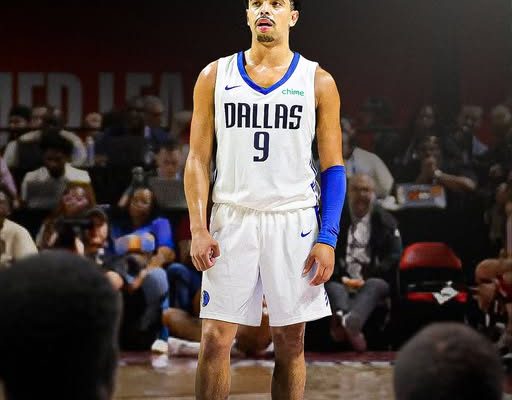The Dallas Mavericks are no strangers to uncovering overlooked talent, but their recent find in Ryan Nembhard might be one of their most intriguing yet. Just three games into his NBA Summer League stint, the Mavericks decided they had seen enough. Nembhard, a poised, high-IQ point guard with a mature feel for the game, impressed the Dallas front office and coaching staff so much that they pulled him from further competition—not because he struggled, but because they were convinced of his readiness. It’s rare for a rookie guard, especially one selected in the second round, to earn that kind of early confidence, but Nembhard’s brief stint in Las Vegas was more than enough to confirm the hype building around him quietly.
Nembhard’s numbers in the Summer League were solid but not flashy—11.3 points and 6.7 assists per game. But anyone who watched him play understood that his impact extended far beyond the box score. He commanded the floor like a seasoned veteran, dictated the pace, made teammates better, and never looked overwhelmed. His decision-making was precise. His demeanor was calm. His ability to dissect defenses and create plays resembled someone far more experienced than a 20-year-old rookie. The Mavericks took note and made what many around the league viewed as a bold but smart decision: rest him. That move was the team’s way of saying, “We’ve seen what we needed to see. He’s part of our future.”
Ryan Nembhard’s journey to this point has been shaped by both pedigree and perseverance. As the younger brother of Andrew Nembhard, who carved out a strong role for the Indiana Pacers, Ryan arrived in the NBA with a chip on his shoulder but also with the foundational tools of someone well-trained in the nuances of the game. He played his college basketball under head coaches who emphasized discipline and structure—first at Creighton, then Gonzaga. At both programs, he was given the keys to the offense, and at both, he demonstrated leadership, toughness, and the ability to show up in big moments.
In fact, it was during his time at Gonzaga where Nembhard truly flourished. The Bulldogs, accustomed to Final Four contention, leaned on Nembhard to steer the ship. His ability to control tempo, get his teammates involved, and keep turnovers low stood out. He wasn’t the flashiest guard in college basketball, but he was one of the most reliable—and in the NBA, that quality is often underappreciated but highly valued. The Mavericks recognized that his game might not scream highlight-reel sensation, but it does whisper something far more sustainable: stability, consistency, and long-term upside.
The Mavericks’ decision to shut Nembhard down early mirrors what some teams have done in the past with players they believe are already NBA-ready. It sends a message to fans and other teams alike: this player isn’t just a prospect; he’s a potential rotation contributor from day one. It’s not about protecting him from injury—although that’s always a concern—it’s about preserving his body and his confidence. More importantly, it’s about integrating him into the system back in Dallas, working him into schemes alongside the likes of Luka Dončić, Kyrie Irving, and potentially Cooper Flagg, the team’s No. 1 overall pick.
What makes Nembhard so intriguing to the Mavericks isn’t just his skillset—it’s how well that skillset fits into their current roster construction. Dallas has long been searching for complementary playmakers who can take some of the offensive load off Dončić and Irving without disrupting the flow of the offense. Nembhard’s pass-first mentality, willingness to defer when necessary, and knack for making the right reads could make him an ideal second-unit floor general—or, down the line, a steady hand in crunch-time rotations.
His basketball IQ is arguably his greatest asset. Throughout the Summer League, he demonstrated an elite understanding of spacing, timing, and floor balance. Whether it was a simple pick-and-roll read or a quick transition decision, Nembhard rarely made poor choices. He didn’t hunt for his shot selfishly; rather, he took what the defense gave him and made the game easier for everyone else on the floor. That’s the kind of presence that often gets overlooked in favor of flashier rookies who fill up highlight reels, but coaches and scouts know better. Smart wins games—and Ryan Nembhard is smart.
There’s also something to be said about his demeanor. Nembhard doesn’t play with arrogance, but he does play with quiet confidence. He looks like he belongs—because he does. Whether facing pressure defense or navigating late-clock situations, he carried himself with the kind of composure that is typically associated with veterans. That alone turned heads in Las Vegas. The Mavericks’ brass weren’t just evaluating talent; they were evaluating temperament. And Nembhard passed with flying colors.
From a development perspective, the Mavericks now have options. They could assign Nembhard to their G-League affiliate occasionally to get him more minutes, or they could keep him on the bench and slowly feed him real NBA reps. But make no mistake—he’s not being treated like a stash-and-develop guy. His early shutdown suggests that Dallas views him as someone who could contribute sooner than later. With a franchise window open and a roster built to contend, the Mavericks are not in the business of wasting time. If they see a player who can help, he’ll get opportunities.
There’s also the mentorship angle to consider. Sitting behind Kyrie Irving—one of the most skilled ball handlers and creators in NBA history—Nembhard will be in an ideal position to grow. He’ll be able to study Kyrie’s footwork, handle, shot selection, and creativity on a daily basis. For a young guard trying to master the nuances of NBA-level scoring and facilitating, that’s like getting a masterclass every practice. And let’s not forget Luka Dončić’s influence either. Playing alongside an offensive savant like Luka can teach a young guard how to maximize angles, control pace, and exploit mismatches.
Beyond the technical and tactical side of his development, Nembhard brings a competitive edge that Dallas loves. He’s not just a floor manager; he’s a competitor. He plays hard, he defends with effort, and he doesn’t back down. That tenacity, combined with his skill and feel for the game, makes him a sneaky candidate to carve out a meaningful role during his rookie campaign. Fans should not be surprised if Nembhard finds himself earning more minutes as the season progresses, especially in situations where ball security and composure are needed.
Another underappreciated aspect of his game is his defensive ability. While not the most physically imposing guard, Nembhard stays in front of his man, fights through screens, and communicates well. He won’t be a lockdown defender overnight, but he’s fundamentally sound and coachable. That’s exactly what coaches love when developing defensive schemes—someone who can execute the plan, rotate correctly, and stay disciplined. In a league where young guards often get exposed on defense, Nembhard’s effort and awareness are already a positive.
The Mavericks’ belief in Ryan Nembhard reflects an organizational shift toward smarter, team-oriented basketball. They’re no longer just hunting stars or highlight plays—they’re building infrastructure. In a Western Conference loaded with talent, every rotation piece matters. Every minute on the court needs to be optimized. Nembhard’s style of play—unselfish, mature, and composed—offers exactly that kind of efficiency.
There will be challenges, of course. Every rookie has growing pains, and Nembhard will have to adjust to the speed and physicality of the NBA regular season. But he’s entering a structure that wants him, believes in him, and is willing to give him the time and space to grow. That’s powerful. And when you combine that organizational support with his internal drive and basketball intelligence, the sky’s the limit.
In a draft class loaded with athletic wings and high-scoring guards, Nembhard may not have grabbed national headlines. But that’s fine. The Mavericks aren’t chasing headlines—they’re chasing wins. And Ryan Nembhard looks like the kind of player who helps you win games. Steady, skilled, and supremely composed, he might just be one of the biggest steals of this draft cycle.
Time will tell how his NBA journey unfolds, but if the early signs are any indication, Dallas may have found more than just a second-round contributor. They might have discovered a future cornerstone of their second unit—or something even bigger. One thing is certain: Ryan Nembhard has arrived, and the Mavericks are ready to build with him.



